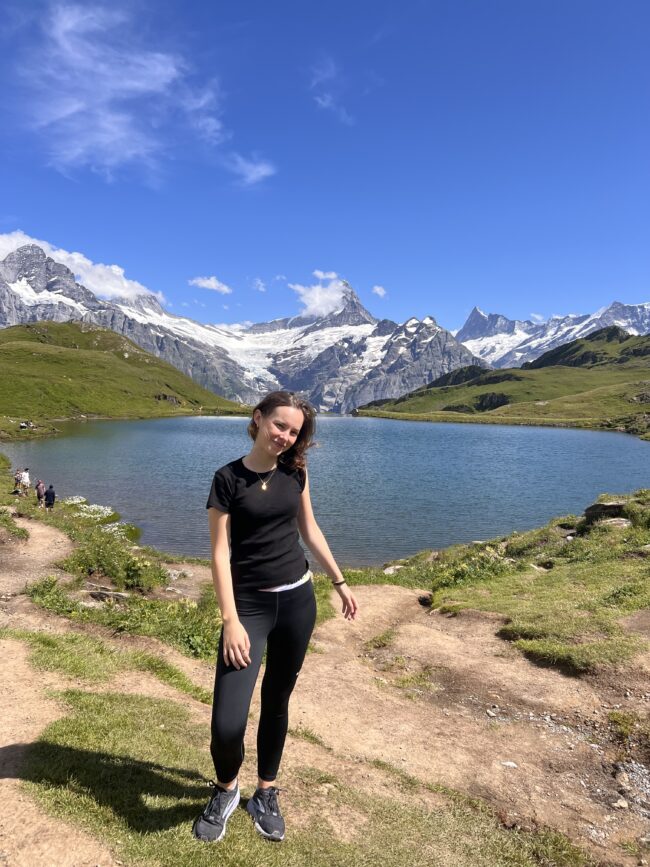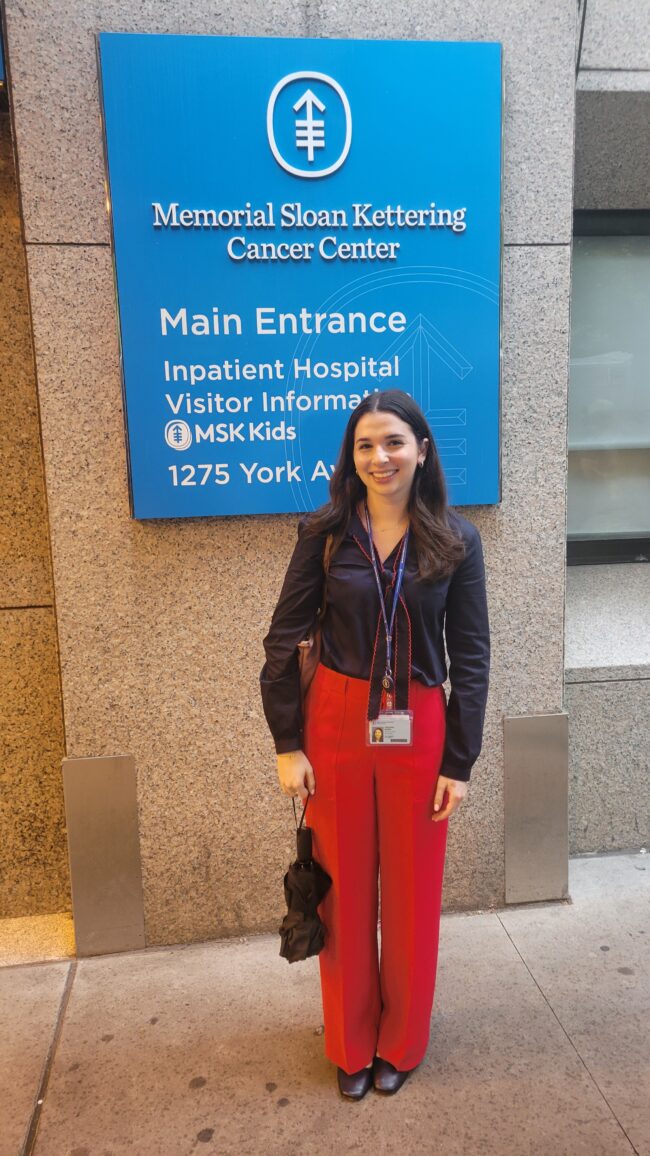The Denning Global Fellows in Sustainable Development program takes undergraduate students across the globe for a summer of fully funded research and study abroad. This summer, three Columbia students majoring in sustainable development are conducting independent research as recipients of the fellowship, working on projects spanning global policy, climate vulnerability assessments and urban research and fieldwork. From local impacts in the New York City health care system to research conducted in Bern, Switzerland and Venice, Italy, Grace Vera, Yardena Rubin and Jinhao (Hans) Bai share the global impact of this fellowship and their work in sustainable development.
We caught up with Vera, Rubin and Bai to hear about their summer research experiences and how they relate to coursework in Sustainable Development.
Q&A with Grace Vera

A rising senior in the dual degree program with SciencesPo in Paris, Vera is currently completing a research assistantship at the University of Bern’s Institute of Political Science in Bern, Switzerland as a recipient of the Denning Global Fellowship.
Vera is originally from South Florida, and developed a strong connection to nature and coastal conservation growing up near the ocean, where she would watch the sunrise on the water and snorkel by a local shipwreck. Now living in New York, Vera has adjusted to both the urban environment and the extreme winters, and loves exploring new neighborhoods and the city’s global food scene.
What drew you to the sustainable development major?
At SciencesPo, we had a mandatory introduction to climate studies course, Ecological Literacy. Through that course, I found that climate policy and sustainable development could be an interesting way to bridge my interests in politics, international relations and the environment. I love that this field is always innovating and changing as we find new avenues for global cooperation, new policy instruments and carbon-neutral technologies. It feels like, going into a career in climate, I’ll be witnessing this change first-hand.
The sustainable development major is the perfect fit because it’s focused without being limiting. I love that I can take a range of courses, from Climate Systems Science to Economics and Financial Methods for Sustainable Development, and have them all still be highly relevant to my degree. When I speak to people working in the climate policy field, a lot of them wish they had had the opportunity to learn the specific science of energy and Earth resources, and I am grateful to have that exposure in my undergraduate degree.
Tell us more about your fellowship.
I think the fellowship is the perfect opportunity to explore the sustainable development field beyond the walls of Columbia. I love that it supports a whole range of fieldwork, from labwork to individual research, from NYC to all over the globe, reflecting the truly diverse and flexible nature of this field. Personally, it’s allowing me to learn about how another country is approaching climate policy in their own political system. I think the global nature of the fellowship acknowledges the fact that climate change is a global challenge that will require global solutions.
The application process allowed me to connect more meaningfully with faculty. In finding a faculty sponsor, I was able to create a relationship with a professor specializing in the topics that I am interested in—nature and political systems, and the politics of energy. I think that same energy resonates throughout the department, and I feel as students in the program, we are given so many opportunities to connect meaningfully with professionals and mentors outside of the classroom. The fellowship is another channel for that connection and empowerment.
What project are you completing for the Denning Fellowship?
I am currently participating in a research assistantship at the University of Bern’s Institute of Political Science in Switzerland. Working alongside a professor and a team of researchers, I am tracking Switzerland’s progress toward its 2050 carbon neutrality goals and analyzing survey data to understand public support for alternative energy policies across different demographic groups. Switzerland is a particularly interesting case study for global renewable energy efforts, as its diverse population and direct democracy system provide unique insights into the factors that shape individual voting behavior on energy issues. Our work aims to support policymakers in designing and implementing more effective climate policies which balance competing interests and trade-offs.
This experience feels like the perfect culmination of my last few years of coursework through the dual degree, both in politics and in energy studies. In working on Swiss policy topics, I definitely had to brush up on my first year Intro to Political Institutions class to remember the specifics of Swiss direct democracy. Being surrounded by the beauty of the Alps is also an important reminder of why climate work is so necessary. All of the researchers here are regular hikers, and it’s nice to see professionals in the climate policy field with such a close relationship to nature. I had never been to Switzerland before the fellowship, and even though Swiss-German remains quite the challenge, I would still encourage interested students to think of the fellowship as an opportunity to go far and wide outside of your comfort zone.
Q&A with Yardena Rubin

Originally from Fort Lauderdale, Florida, Rubin is a rising senior in the Columbia School of General Studies and the Jewish Theological Seminary dual degree program. She loves exploring new parts of New York City, spending time outdoors and sharing quality time with friends.
This summer, Rubin is working with Memorial Sloan Kettering Cancer Center on a climate vulnerability assessment, evaluating how climate change could affect both health care facilities and patient populations.
Tell us about the project you are completing.
My main project is a climate vulnerability assessment, which examines how long-term climate trends and extreme weather events affect both health care infrastructure and patient populations. A key component of this assessment focuses on extreme heat, since it poses unique risks to both patients and staff in a hospital setting.
For cancer patients, particularly those undergoing chemotherapy or radiation, heat exposure can exacerbate treatment side effects, worsen underlying conditions and even limit their ability to safely travel to appointments. Delays in receiving time-sensitive therapies during heatwaves can have serious health implications. On the staff side, extreme heat can disrupt transportation systems, causing delays that strain hospital capacity, and also increase occupational risks for employees who may be moving between different environments or working in less climate-controlled areas.
In this project, I am using climate data and heat vulnerability indices to map areas of heightened risk and identify how those risks align with patient demographics and treatment schedules. I am also learning how hospitals plan for these challenges, from cooling infrastructure and emergency protocols to patient communication strategies.
Tell us more about the Denning Fellowship.
The Denning Fellowship gives students the opportunity to engage in meaningful, hands-on projects that connect sustainability to pressing real-world challenges. The application process is clear and flexible, allowing you to propose a project or internship that aligns with your academic and professional goals. What I value most about the fellowship is the freedom to explore an interdisciplinary topic and gain experience in a high-impact setting. My advice for students interested in this opportunity is to focus on a project that excites you and has real-world relevance. The best experiences come from work that connects your studies to tangible outcomes.
I applied for this fellowship because I wanted to understand how climate change affects health in ways that go beyond the obvious environmental impacts. Heat has a cascading effect on health care access, equity and resilience, and seeing how a major institution like Memorial Sloan Kettering is addressing these risks has been eye-opening. One highlight has been collaborating with the sustainability teams and medical staff to understand the operational and human challenges of extreme heat. For students interested in this type of work, I recommend staying curious about the connections between climate and health, and being open to integrating environmental, social and medical data to fully understand the risks.
What skills are you using from the sustainable development program for your fellowship?
This project has shown me how theoretical tools like vulnerability mapping and adaptation frameworks translate into practical strategies for an institution as complex as a hospital. The project also draws on many of the technical and analytical skills I developed through my coursework. I am using GIS to map physical climate risks and overlay them with social and health vulnerability indices to identify which patient populations and facilities are most at risk. I am also working with R for data visualization and statistical analysis, and using Excel to organize, manage and analyze large datasets in a way that is accessible to different teams. This work relates directly to sustainable development because it addresses climate adaptation and resilience in a critical sector. Ensuring that health care systems can continue to function during climate disruptions is essential to protecting vulnerable populations and supporting more equitable, sustainable cities.
Q&A with Jinhao (Hans) Bai

The Denning Global Fellowship took Bai to Venice, Italy, where he spent the summer studying and completing a research project under Jenna Lawrence. Bai is originally from the coastal city of Tangshan in northeast China, and has been living in the United States since completing high school in Charlottesville, Virginia. In his free time, he likes to travel and watch movies and musicals. Bai is currently exploring the venture capital industry as an intern at ZhenFund, a Chinese Angel Fund.
What drew you to study sustainable development?
I learn things better by experiencing rather than memorizing, therefore I wished to design my academic program with as many experiential learning opportunities as I could accommodate. With its abundant opportunities to study abroad and flexible major structure, sustainable development fits this wish perfectly. Besides the Venice Ecology class, I traveled to Bangladesh last spring as a part of my capstone experience.
Tell us about the project you are completing for the Denning Fellowship.
I observed gull-human interactions in Venice and attempted to identify the correlation between gull abundance and human activity patterns. Although no correlation was found during my field observation period, I did record some qualitative case studies of urban gull behaviors. My advice is to remain open to changes once you arrive at the field site. I applied to the fellowship with another research direction that is more literature based, but after I got to Venice, I decided to observe gulls instead as it was another direction I found more interesting.
How has the sustainable development program influenced the skills and experiences you’ve applied to fellowship?
My resilience to cross-cultural settings, which I achieved through the sustainable development curriculum, helps me adapt to new environments quickly. My previous experience in conducting field research with the Bangladesh travel course helped me to enter the research mode more smoothly. Sustainable development is a very relevant issue in Venice, as overtourism is present in the sinking ancient city. Immersing myself in the city helped me understand sustainable development not only environmentally, but also culturally and socially.


